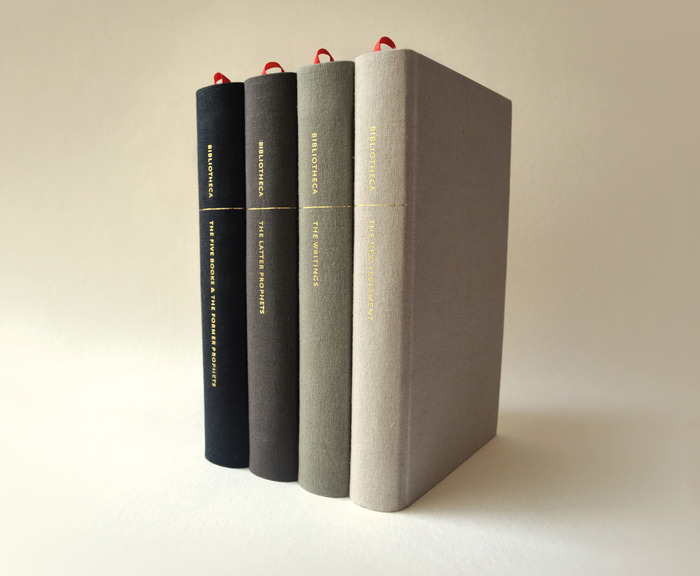I don’t own any copy of the Bible that’s particularly enjoyable to read. I have a massive study edition from my days in Directed Studies, that’s much too heavy to carry anywhere casually. I could use any number of online Bible websites, but it’s hard for me to give the text the kind of focus I’d like when I’m in a context I don’t use for long, focused reading. The place where I’m most likely to encounter scripture in a format I enjoy reading is in the selections incorporated into the Divine Office, which I tend to pray on my phone, during my commute.
That’s why I’m pretty excited about the Bibliotheca kickstarter (h/t Alan Jacobs), where Adam Lewis Green is raising money to design and produce Bibles that are a pleasure to read. The books are broken up into the size of novels, and the text is laid out like a normal book (no double columns or large chapter numbers) so it’s easier to just sit down and read, instead of feeling a little abstracted from the text. Here’s the project’s pitch:
There are a fair number of theological concerns to raise about the project. The artist is not including the Apocrypha, he’s using a translation that I’ve not heard much about before (the American Standard Version) with a couple tweaks to remove archaic words. I’d be pretty suspicious of owning this Bible alone, since Green’s specialty is in design, not translation, but I do love how inviting the book is. It looks like it would be a pleasure for me to read.
Even if the translation were impeccable, I expect that the lack of annotations and footnotes would lead the reader to miss or misunderstand some nuances and meanings of the text, but that might be ok. It’s certainly the case that if I read the Divine Comedy or War and Peace without annotations, there are parts of the story and the characters that I’m missing or misunderstanding, but I also have the chance to be swept along with the story and to feel immersed in the world when I’m not pausing to cross-reference. Thus, I usually avoid the very scholarly, annotated editions for a first reading.
This is why, when I read Hillary Mantel’s Wolf Hall and Bring Up the Bodies, I seldom flipped back to the family trees and dramatis personae, even if I was a little confused about which lord Cromwell was interacting with. I figured I could wait to pause until my confusion actively hindered my reading, rather than needing to be sure about which Earl was speaking. This would be a terrible approach if I were trying to learn history, but that wasn’t why I had picked up the book.
Most Christians aren’t reading the Bible to do theological research, but to know God a little better (or, at least, to identify confusions to take to theologians and/or to prayer). It seems fine to read lightly, trying to be immersed in the salvation story, and to miss a few rich or esoteric details. It wouldn’t make sense to use the Bibliotheca Bible for proof-texting or for maybe even for Lectio divina, but it could be a good way of making the Bible present in day-to-day life, at the same level of authority as just talking about Scripture casually with friends.
I’d love to see Green’s project succeed, not because it’s the best Bible to own, but because it’s thoughtfully focused on the reader, rather than just the scholar. I’d love to see other orthodox publishers look to this project for inspiration.
In the meantime, do you commenters have editions of the Bible that you find particularly pleasurable to read?













